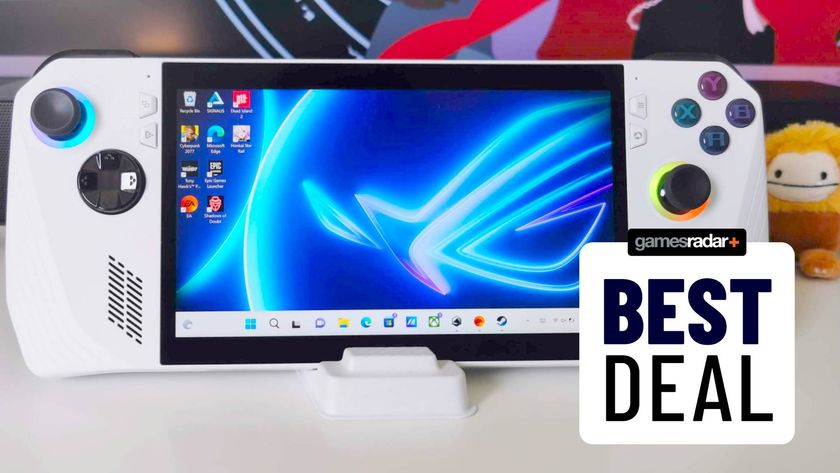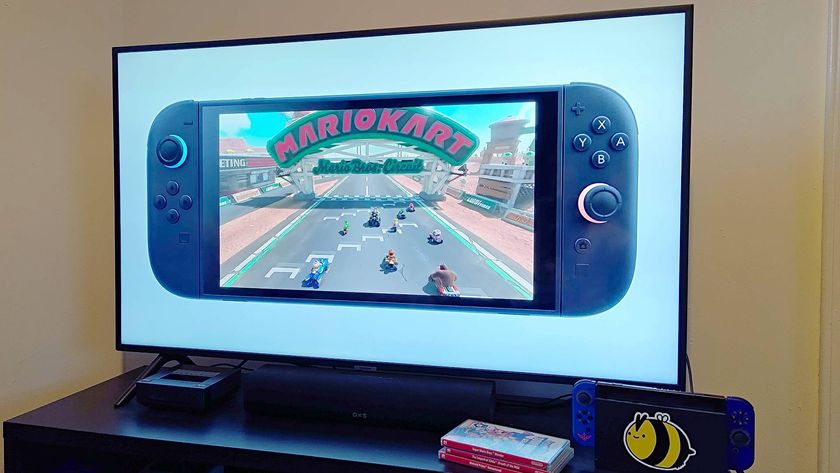The best Steam Deck accessories 2025: handy handheld add-ons
Kit out your Deck
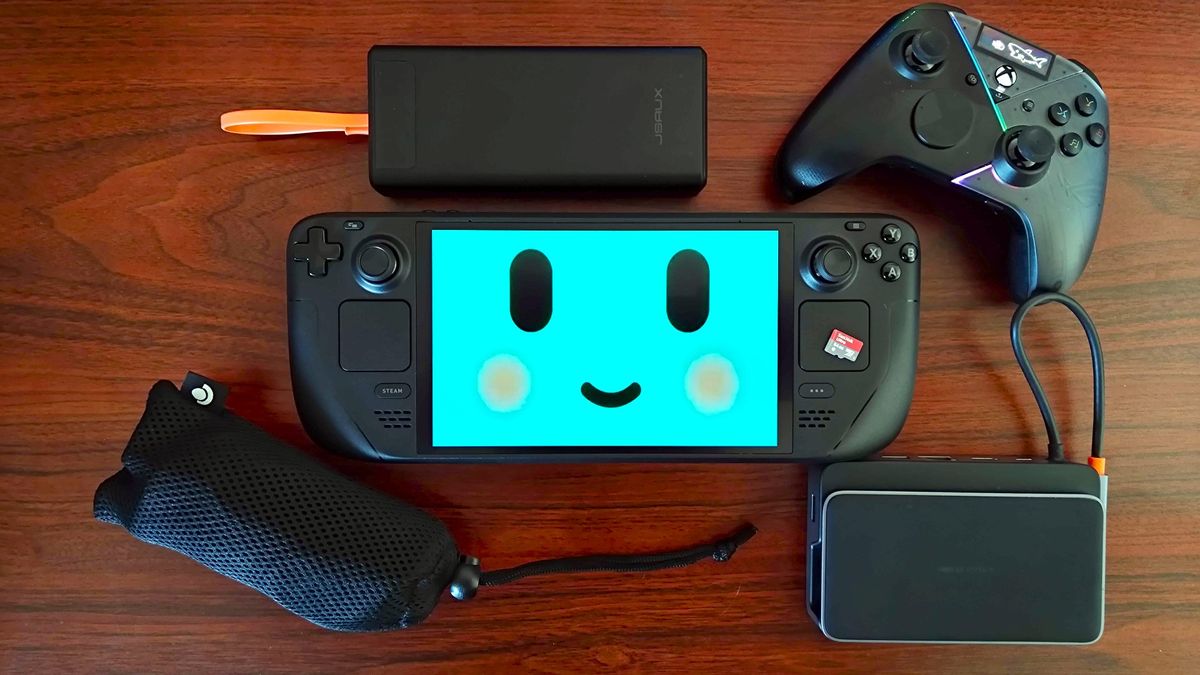
Without the best Steam Deck accessories in my backpack, my gaming handheld setup would be a lot less enjoyable. Valve's portable powerhouse is great in its own right, but there are gadgets that can completely shake up the way you play on the go, extend your battery life, increase your storage, and prevent any nasty accidents.
There are some Steam Deck accessories that I'd say are anything but optional. That includes everything from a decent case for protection to something like a Steam Deck dock, as the latter will help turn many of the best gaming handheld options into hybrid PCs. However, you'd be surprised how many add-ons are actually compatible with devices like the Steam Deck OLED, and some will work with portable devices of all shapes and sizes.
I've been testing the best Steam Deck accessories since the device's 2022 launch, and I was actually one of the first to cover compatible docking stations. So, if you're looking for a true insight into gadgets worth pairing with your handheld gaming PC, you've come to the right place. Many of my picks will also work just as well with handhelds like the Asus ROG Ally and Lenovo Legion Go (yes, I've tested them) so even if you're not batting for Valve, you'll want to take a peek.

Phil is somewhat of a Steam Deck accessories expert, having tested the latest docks and gadgets from the very beginning. They also love to come up with creative portable PC setups you can take on the go, so you can rest assured their top add-ons are worth permanently keeping in your backpack.
The Quick List
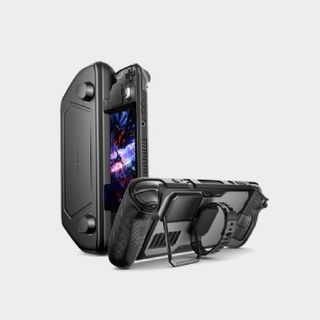
The best case
Superb, modular armor for your Deck with added modular capabilities round the back.
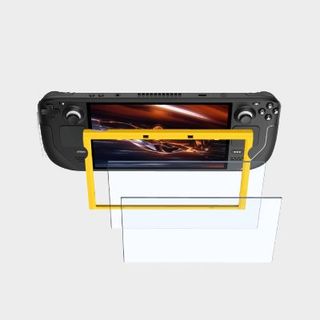
The best screen protector
A low-cost way to avoid screen scratches and provide a protective barrier for the Deck's front.
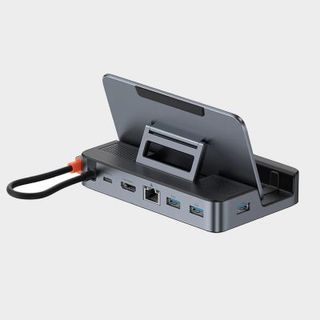
The best dock
A fantastic hub with plenty of ports and an adjustable cradle that'll accommodate your Steam Deck case or shell.
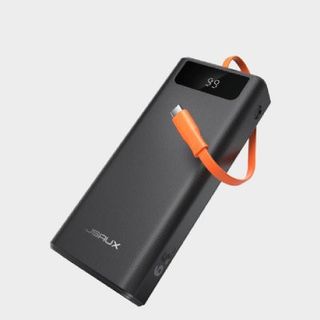
The best power bank
A great way to extend your Steam Deck playtime that will take up less room and provide the handheld with the right amount of juice. especially when on the go.
Read more below
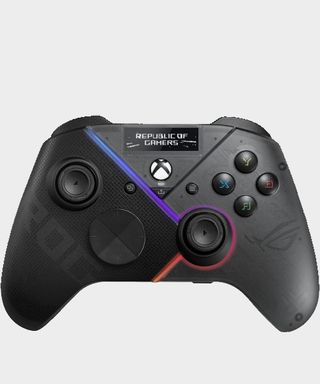
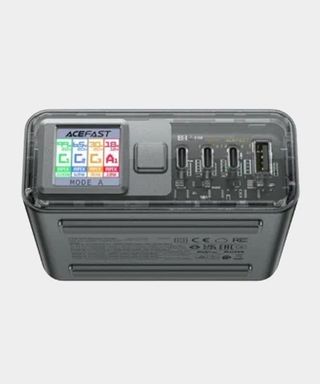
The best charger
If you need a way to charge your Deck and all its accessories, this hub will check all the boxes.
Load the next 5 products ↓
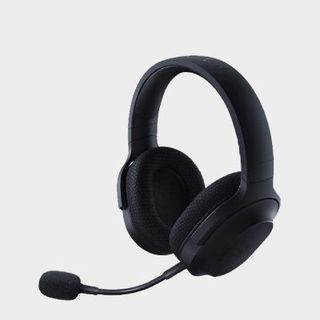
The best headset
A versatile pair of cans that'll pair with Valve's portable and other devices without a hitch,
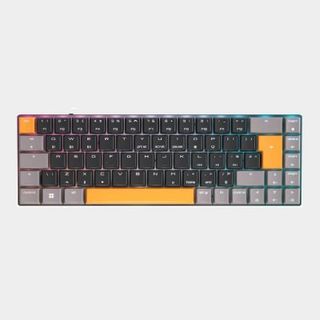
The best keyboard
This smaller keeb is perfect for compact Steam Deck desktop setups both at home and on the go.
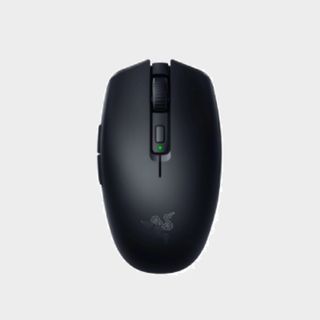
The best Steam Deck mouse
It's lightweight, packs Bluetooth, and pairing it with your Steam Deck won't break the bank.
Read more below
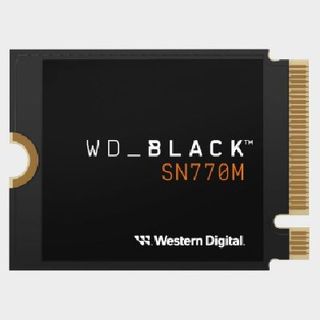
The Best SSD
This 2230 drive will expand your internal storage and help you take more of your Steam library on the go.
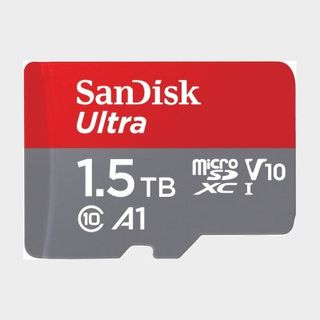
The best microSD card
If you'd rather not crack open your expensive handheld, this SD card will quickly add heaps of speedy external storage.
The best Steam Deck case





Specifications
Reasons to buy
Reasons to avoid
Yes, we know, the Steam Deck comes with an exceptional case. However, the Jsaux ModCase adds modular superpowers that will make using add-ons like power banks much easier. Plus, it'll take up less room in your backpack while offering up a layer of front armor.
✅ You need low-profile protection: Rather than using a big zip-up clamshell design, the ModCase feels like an integrated solution with an easy access shield at the front.
✅ You want modular functionality: This case's modular strap will save you from balancing add-ons like battery banks on your knee or other precarious places.
❌ You're happy with Valve's case: The Steam Deck comes with an exceptional case, so if you don't need extra functionality, there's little point buying an additional shell
❌ You need storage: While this case will hold onto add-ons, it doesn't provide anywhere to put your whole collection.
Design: By blending a formfitting hard plastic shell with a rubber back, Jsaux has enabled the ModCase to provide maximum protection without the bulk. Rather than having to mess with zips, you'll be able to lift the front shield away from the case for quick access to the handheld, while the back section will remain in tact to boost ergonomics.
Features: As we've already spoiled, the main draw of this case is its modular rubber strap, which is designed to cling onto small accessories that you might use during play. For example, if you're planning on playing a game that will slurp a lot of battery, you can strap in a power bank and make it feel like a part of the handheld. There are naturally limits in terms of weight, but for the most part, add-ons will stay put on back without a fuss.
Performance: I've used the ModCase for an extended period in various environments, and it has reliably protected my Steam Deck from all sorts. The front plastic shell in particular has saved the handheld from a bunch of mishaps, from things dropping near the device to even cats getting too curious for their own good (cat claws are the devil when it comes to screens.)
Verdict: If you do need a case for your Deck that'll also provides a way to use other add-ons, the Jsuax ModCase is one of the first we'd recommend. It's perhaps not the most attractive option out there, but that's nothing that can't be remedied with a few stickers and personal touches. Depending on how careful you are with your devices, aesthetics might not matter when it comes to saving pricey portables from the perils of use.
Read more: Jsaux ModCase review
The best Steam Deck screen protector




Specifications
Reasons to buy
Reasons to avoid
Look, we get it, screen protectors aren't remotely exciting. What we will say is that not having scratches all over your Steam Deck screen is nice, and the only real way to prevent any blemishes ever appearing is to use something like Jsaux's tempered glass kit.
✅ You want to prevent scratches: If you'd rather not come across marks on your screen over time, using a screen protector is a good preventative measure.
✅ You need something easy to fit: Jsuax's protectors are made to fit the Deck and are a breeze to apply, so you won't have to worry about air bubbles and misalignment.
❌ You think a case is enough: If you're confident that your Deck won't get scratched up during play, then you might want to go without.
❌ You're worried about reflections: This screen protector won't increase reflections by much, but the tempered glass won't reflect light quite like Valve's anti-reflective coating.
Design: Made of tempered glass that's only 0.33mm thick, these Jsaux screen protectors are pretty unintrusive. In fact, they pretty much drop straight into the Steam Deck's bezel space without protruding, which helps them feel like a natural part of the handheld. If you've ever tried to fit a generic option to something like the Nintendo Switch or your phone, you'll know the pain of getting things align properly without bubbles, and that's not something we experienced using this kit.
Features: With a 9H hardness rating and 99.99% transparency, Jsaux's screen protectors will resist any scratches thrown at them while being almost invisible. As for fitting, the pack comes with a handy guiding frame that will ensure the protector is properly attached, which is perhaps why we were able to fit one to the Steam Deck without a hitch.
Performance: To see whether a Jsaux screen protector can actually live up to the company's claims, I decided to virtually attack our sample with a variety of sharp tools. That's not to say anyone would ever come at your handheld with a kitchen knife, but if they did, you can rest assured that the protector will shake off any damage with no marks. I even accidentally dropped my Deck during testing onto its face, and the tempered glass seemingly had my back.
Verdict: There are tons of different screen protector options out there, but we can attest to the fact that Jsaux's kit will provide more than enough protection. A pack of two also costs less than a cup of coffee, meaning you won't have to pay an upsetting amount for vital coverage.
Read more: Jsuax Screen Protector for Steam Deck review
The best Steam Deck dock





Specifications
Reasons to buy
Reasons to avoid
We've tested a bunch of the best Steam Deck dock contenders, and the Baseus 6-in-1 punches harder than it's competition. Not only will it easily hold your Deck with a case attached thanks to its adjustable cradle, but it also comes with a good selection of ports for hooking up to both desktop and living room setups.
✅ Your Steam Deck has a case: Unlike many other docking stations, Baseus' adjustable cradle can hold handhelds with a case or shell attached,
✅ You care about build quality: The Baseus Steam Deck dock is solid, and its blend of metal and plastics feel pretty premium.
✅ You use your Steam Deck at a desk: Small choices like keeping Ethernet round the back and the dock's ability to fold down when not in use mean it'll fit in nicely with most desk setups.
❌ You need DisplayPort: This dock only comes armed with HDMI, and if you'd rather not use an adapter, you're better off looking something that better suits your display.
❌ You want something cheaper: The Baseus Steam Deck dock isn't the cheapest option out there, and there are alternatives that are normally available for less.
Design: Rather than sticking with a cradle specifically for the Deck, the Baseus 6-in-1 uses an almost deck-chair design that can be set at various angles and widths. This effectively means you won't have to remove cases and shells when parking the portable, but also means chonkier handhelds like the Ayaneo 2S or even the likes of the Asus ROG Ally and the massive Lenovo Legion GO.
The rest of the dock is relatively standard, with most ports situated round the back of the device. As for built quality, Baseus has gone with a mix of durable plastic and rubber, and while you'd think that would feel less premium than aluminium, it somehow manages to feel more robust than other metal-clad alternatives out there.
Features: We've already touched on one of the Baseus 6-in-1's biggest features, as its adjustable cradle incorporates functionality into its design. The rest of its traits relate to its port specs, with HDMI 2.0 providing a way to easily connect the Steam Deck to a TV or even a gaming monitor. You'll also be able to make sure of three USB-A ports and Gigabit ethernet, enabling you to use Valve's handheld at a gaming desk with a bunch of peripherals.
Performance: Just like all docking stations, the Baesus 6-in-1 won't boost the Steam Deck's performance. However, it does provide the handheld with a reliable way to connect to external screens, keep everything powered with 100W power delivery, and provide the portable with a steady perch. We've yet to encounter any glitches or connectivity hiccups when using this dock, and hooking up to USB-C has held up as a seamless experience.
Verdict: Out of all the docking stations out there for Steam Deck, the Baesus 6-in-1 feels like the most well-rounded option. There are cheaper add-ons that'll provide a similar experience, but that adjustable cradle and its exceptional built quality help this one clinch the top spot.
Read more: Baseus 6-in-1 Steam Deck dock review
The best Steam Deck power bank




Specifications
Reasons to buy
Reasons to avoid
There's no shortage of power banks on the market, but it's clear that the Jsaux 20000mAh 65w was created with handhelds like the Steam Deck in mind. Not only will it provide more than enough juice to keep your portable charged for an extended period, but it'll even fit onto cases like the ModCase for maximum compatibility.
✅ You want something portable: Jsaux's power bank is made specifically with the Steam Deck in mind, and it's small enough to strap to its back.
✅ You need a long battery life: If you know you're going to be away from a power outlet for a while, this is the power bank you'll need.
❌ You want to use peripherals: You might benefit from a higher wattage than 65W if you want to power more than just the Steam Deck.
❌ You need more ports: This specific power bank keeps things trim with only a few ports at the top.
Design: Unlike some 20,000mAh options, Jsaux's 65W power bank is pretty slimline. That means it'll fit into your backpack with no issues, but also provides you with the option of using something like the company's own ModCase to attach it to the back of the Steam Deck. Doing so will minimise the amount of peripherals you have lying around on your travels, which is incredibly handy if you're on a plane and only have one of those little tables.
Features: One the front, the Jsaux's bank has a tiny screen that displays vital information like charge time, capacity and voltage. A handy extra for those of you who get nerdy about stats, but it'll also help you work out what you can realistically keep powered up on the go. It's also got a built-in USB-C cable, and while we'd rather it was removable, it will save you from misplacing your own and not being able to charge up your Deck.
Performance: When it comes to longevity, the Jsaux's 65W Power Bank performs admirably. We managed to squeeze three full charges out of the unit's cells before needing to recharge, and it can even keep portable monitors like the Jsaux FlipGo running for around two hours with the Steam Deck connected. Not too shabby for a portable charger you can fit in your pocket.
Verdict: Admittedly, there are power banks out there that boast a greater capacity and wattage,. But, when it comes to Steam Deck, this Jsaux option strikes a better balance between specs and portability.
Read more: Jsaux 20000mAh 65w review
The best Steam Deck controller





Specifications
Reasons to buy
Reasons to avoid
Not everyone in the 12DOVE hardware team vibes with what the Asus ROG Raikiri Pro has to offer as a PC controller. However, the fact it wields 2.4Ghz and Bluetooth while also offering up pro controller features and a great aesthetic makes it a strong option for Steam Deck setups.
✅ You want Bluetooth and 2.4Ghz: This pad can provide both wireless options alongside a wired connection, and you can seamlessly hop from one option to the other using the built-in OLED screen.
✅ You want good battery life: Clocking in at around 48 hours, this controller can handle long play sessions.
❌ You care about back buttons: This controller's additional buttons won't be suited to everyone's hands
❌ You have big hands: Asus' pad is on the small side, which might make it hard for big palms to grip.
Design: The Raikiri Pro is pretty striking, with a two-tone black and translucent shell helping distract from its fairly typical Xbox-shape. Of course, the visual heavy lifting is mostly carried out by its tiny OLED screen at the top, which serves as a way to display fun gifs and switch from 2.4Ghz to Bluetooth on the fly among other functions.
As for ergonomics, the pad feels pretty similar to an Xbox controller in the hands. Your milage may vary based on your preferences and the size of your mitts, but the controller offers up comfortable access to its face buttons, sticks, and triggers. The additional back buttons are a tad small compared to some options out there, so keep that in mind if you rely on extra inputs.
Features: Once again, we've spoiled some of the core perks of this controller when chatting design. But, there are a couple of pro controller extras, like trigger locks that can be further customised with Asus' Armoury Crate software. You'll also be able to set profiles that can be accessed using the aforementioned OLED screen, which might be handy if you need a different setup when using the Steam Deck.
Performance: In testing specifically with the Steam Deck, the Raikiri Pro's 48 hour batter promises held up. The controller is also able to reliably jump back and forth from using Bluetooth to 2.4Ghz wireless without any fuss, which is extremely handy if you want to either share the pad between devices. Connectivity also remained strong over both wireless methods, whereas Bluetooth stability can be shaky when using alternatives like the official Xbox Wireless controller.
Verdict: It's needless to say that the Raikiri Pro is far from perfect, but when it comes to providing the Steam Deck with connectivity options and comfortable external controls, this pad gets a lot right.
Read more: Asus ROG Raikiri Pro review
The best Steam Deck charger





Specifications
Reasons to buy
Reasons to avoid
The Steam Deck may come with a charger, but the Acefast Power Station Z4 will charge the handheld and all its accessories without breaking a sweat. The 218W GaN hub has more than enough oomph to deal with the portable PC and fast charge three other devices, saving you from dealing with a mess of cables when charging everything up.
✅ You've got lots of devices: If you routinely need to charge you Steam Deck and all its accessories at home, this all-in-one hub is a game changer.
✅ You want something compact: The Z4 will take up less space on your desk than a sandwich, all while delivering a total of 218W to devices.
❌ You want something portable: If you usually charge your handheld and gadgets on the go, a power bank might be more suitable.
❌ You'd rather just use separate chargers: If you're happy using each device's included adapter, you won't benefit from picking this hub up.
Features: Thanks to the power of GaN (Gallium Nitrate) technology, the Acefast Power Station Z4 takes up minimal space on your desk while delivering exceptional power to all of your devices, including the Steam Deck. It can satiate the portable's 45W requirements and still have plenty of capacity to charge another handheld and any accessory you can throw at it, and you can select from various power modes to deliver specific power to each.
Design: While the Z4 is designed to be discrete, it's also pretty attractive to look at thanks to its tiny TFT color screen and transparent front plate. The overall aesthetic is subtle yet stylish, maintaining understated flare while ensuring it doesn't dominate your space. Despite its size, it also has enough heft to keep itself from skating across your desk when you move cables, something that helps it achieve a premium vibe that matches it price tag.
Performance: We've tested the Z4 using the Steam Deck OLED, other handhelds like the Ayaneo Flip DS, and various accessories like earbuds. The result? The hub charged everything we could throw at it while embracing fast charging where available. Being able to switch specific ports to output 100W means it'll also supply juice to gaming laptops with Power Delivery ports, meaning it'll effectively work with any device with USB-C ports.
Verdict: The Power Station Z4 is admittedly pricey, and the fact it doesn't at least supply a few cables is a bummer. That said, it's also an incredibly versatile charger for the Steam Deck and any other gadget you may have to hand, providing a clutter free experience even with four devices hooked up at once.
Read more: Acefast Power Station Z4 review
The best Steam Deck headset



Specifications
Reasons to buy
Reasons to avoid
The Razer Barracuda X isn't just for the Steam Deck, but that's exactly what makes it one of the best gaming headsets for the handheld. By providing both wired and wireless options, this pair of cans provides more value and will enable you to use it with the portable both on the go and at home.
✅ You play in handheld mode on the go: This is where the Razer Barracuda X is most at home. With its comfort, ease of wireless connection, and excellent battery life, it's the perfect headset to take on the road.
✅ Portability is a big factor for your commute: That Bluetooth connection, subtle form factor, and swivel design (as well as the audio's performance in music and podcasts) means the Barracuda X can easily double up as a pair of commuter headphones.
✅ EQ settings don't interest you: If you don't want all the faff of setting up the perfect equalizer balance, the plug and play nature of the Barracuda X is perfect. Of course, you can still quickly tweak in the mobile app - but there's no intimidating dials and levels to concern yourself with here.
❌ Software support is important: If you do want to tinker with your audio balance, the Razer Audio app is restricted compared to Synapse. The Barracuda X doesn't support Synapse 3, so you are stuck with a watered down set of controls.
❌ You want to fall back on a wired connection: The wired connection isn't powered, so we noticed a significant drop in quality when bringing a cable in to play.
Design: Unlike some gaming PC headsets out there, the Razer Barracuda X looks far less like a peripheral and more like fashionable tech. That's something that'll make all the difference if you want to use them when on a train or within view of the public, as no one want to look like John Madden just so they can hear their games. In terms of comfort, lightweight plastic and breathable memory foam cushioning will prevent the Barracuda from weighing down your noggin, and all the buttons and ports are easily accessible from the left hand cup.
Features: The Barracuda X is a jack of all trades, dishing out 2.4Ghz, Bluetooth, and wired connectivity. All three will benefit Steam Deck users, as the included dongle can hook up to your docking station while Bluetooth and 3.5mm jack options accompany you outside. Being able to do all three also means this headset will work with virtually any system, whether you're looking for Nintendo Switch accessories or an audio upgrade for PS5 and Xbox Series X.
Performance: In terms of fidelity, the Barracuda X provides a rich, well-balanced profile with equal attention to mids, bass, and treble. All three combine to produce a surprisingly sophisticated sound signature, resulting in one of the best audio solutions we've tested for under $100. Battery life also holds up pretty well too, with a 50+ hour runtime helping cut the cord for longer while you galivant with the Steam Deck in hand.
Verdict: There are plenty of best Steam Deck headset contenders to consider out there, but the Razer Barracuda X is the one we'd reach for if heading out for the day with Valve's handheld. Keep in mind if you opt for this set of cans, you'll effectively have headphones you can use across every platform at home and in your backpack.
Read more: Razer Barracuda X (2022) review
The best Steam Deck keyboard





Specifications
Reasons to buy
Reasons to avoid
You don't have to pair the Steam Deck with a smaller keyboard, but options like the Cherry MX-LP 2.1 are endlessly portable. You won't even have to worry about compromises as this mechanical keeb packs the company's MX Low Profile switches into a 65% package alongside a hearty selection of connectivity options.
✅ You need something compact: The MX-LP 2.1 is one of the most portable mechanical keyboards we've tested, offering up everything you'd need in a much smaller footprint.
✅ You use Desktop Mode regularly: Rather than trying to use Valve's on-screen keyboard, you'd be much better off using something that exists in the physical realm.
✅ You only use mechanical: This keyboard uses Cherry MX, and they provide one of the best typing experiences around.
❌ You care about ergonomics: We wouldn't advise writing a whole novel with this keyboard, as its smaller design doesn't hold up in longer sessions.
❌ You need more on-board controls: Due to the keyboard's size, functionality is somewhat reduced compared to conventional models.
Design: As far as 65% options go, the Cherry MX-LP 2.1 is one of the best gaming keyboards when it comes to looks. That's largely thanks to its vivid choice of cap colors, with orange accents contributing to a vibe that feels very Valve Orange Box-chic. aesthetics aside, it's also super light, weighing in at just 423g thanks to its choice of layout.
Features: Armed with Cherry Low Profile Speed switches, the MX-LP 2.1 will provide a swift and accurate typing experience. The keyboard maker's choice of ABS caps this time are also super smooth and soft, even though we'd have preferred PBT keycaps at this price point. As for connectivity, you won't remotely be stuck for options, with 2.4Ghz, Bluetooth, and USB-C all providing a way to hook up directly to the Steam Deck and docking stations.
Performance: Despite featuring a lower profile and reduced footprint, the MX-LP 2.1 provides a fluid typing experience. Each cap provides a nice level of resistance and avoids any key wobble or reverb. Cherry's soft keycap and switch combo also makes for a smooth experience in games, with frantic adventures like Alan Wake and more complex outings like Elder Scrolls Online holding up great. Naturally, it'll also provide reliable results when tapping away in SteamOS' Desktop Mode, which is vital when it comes to the handheld's hybrid capabilities.
Verdict: If you're looking for a keeb that takes up as little room as possible at your Steam Deck setup without caveats, the Cherry MX-LP 2.1 has your back. There are natural compromises tied to it being 65%, but you could argue full blown layouts are just as much of a hindrance when it comes to using them with a handheld.
Read more: Cherry MX-LP 2.1 review
The best Steam Deck mouse




Specifications
Reasons to buy
Reasons to avoid
Look, the Razer Orochi V2 is absolutely going to lose a fight with most of the best gaming mouse options out there. That is until it comes to on the go performance, as this clicker pulls a fantastic portable punch for well under $100 / £100.
✅You need exceptional battery life: This mouse can keep going in Bluetooth mode for up to 950 hours, so you won't have to swap batteries often.
✅You want something small: The Orochi V2 is fairly dinky, so squeezing it into your Steam Deck backpack shouldn't be an issue.
❌ You prefer a built-in battery: This mouse goes a bit old school with AA batteries, which could be a deal breaker for some players.
❌ You need something more ergonomic: Razer's budget mouse sticks with a fairly bog standard design that might feel uncomfortable after extended use.
Design: The Orochi V2's asymmetrical body is pretty minimalist for a Razer peripheral, and that could be a good thing if you're fed up of RGB shenanigans and aggressive gamer gear angles. There's an argument to be made about whether sticking with a basic design will hinder ergonomics, but if you simply need a clicker for your Steam Deck, that might not be so much of an issue.
Features: Kitted out with both Bluetooth and HyperSpeed 2.4GHz, you'll have options when connecting to the Steam Deck or its matching docking station. Sadly, the mouse does ditch having a wired fallback, but that's largely because it uses a single AA battery for power. That itself is both a feature and a drawback depending on your preferences, but Razer does claim that a single cell will keep the peripheral active for a whopping 950 hours.
Performance: At a glance, it might feel like the Orochi V2 is a basic mouse, but it actually has more gaming guts that its exterior would suggest. Not only does it make use of Razer's second gen mechanical switches, it also has a Razer 5G sensor with 18,000 DPI capabilities. Sure, most of you will simply be looking for a clicker to navigate SteamOS in desktop mode with when the need arises. But, if you do feel like playing some faster faced FPS games on the Deck, this mouse will provide some slick performance.
Verdict: For the money, the Orochi V2 is a strong Steam Deck mouse option for using on the go, and it might even be enough to satiate your gaming PC needs. Just keep in mind that if you hate replacing batteries, you'll end up wanting to call pest control on this rodent.
Read more: Razer Orochi V2 review
The best Steam Deck SSD





Specifications
Reasons to buy
Reasons to avoid
Not everyone will be brave enough to swap out their Steam Deck SSD, but those who are should probably grab the WD Black SN770M. The storage giant has effectively shrunk the same tech within its gaming SSD range into something that'll fit inside the handheld, and you'll have a five year warranty to fall back on if things go wrong down the road.
✅You want maximum storage: Opting for a WD Black SSD will enable you to add up to 2TB to Valve's handheld.
✅You want to avoid microSD cards: If you'd rather not mess around with external storage, this solid-state drive will act as a more permanent solution.
❌ You'd rather not open your Deck: Upgrading your Steam Deck SSD will come with risks, and it's probably best not to attempt it yourself if you're not confident.
❌ You'd rather use microSD cards: You can technically just use SD cards to hold your additional Steam games, and there's now 1.5TB capacities out there,
Design: Those of you unfamiliar with M.2 SSD formats might not be aware that they come in a variety of sizes. While the drive within your gaming PC might be almost as long as a stick of RAM, the one inside the Steam Deck is smaller than a CPU. The key is to look for '2230' drives rather than a conventional '2280' version, with the WD Black SN770M serving as an example of the former.
The only real difference between the WD Black SN770M and the drive within your Deck is that Valve includes a small piece of shielding with its SSD. You'll have to remove and reapply this to the SN770M if you do go through with a swap, and while it'd be handy if the new drive came with it already applied, it's easy to see why it doesn't since it's compatible with a variety of handhelds.
Features: The SN770M is actually a Gen 4 drive, meaning it can achieve faster speeds than the one within your Deck. Not that you'll feel the benefits, as Valve's handheld will still max out at gen 3 standards. Still, you're getting a drive that is somewhat futureproofed, which could matter if you decide to pick up a Steam Deck 2 when it inevitably arrives.
Performance: In our tests, the SN770M produced read speeds of 3,400.47 MB/s, coming in ever so slightly faster than the OG Micron drive within the Steam Deck OLED. Effectively, this means you'll be able to upgrade your handheld with up to 2TB storage and not lose any performance in the process. Pretty worthwhile since chonky RPGs like Baldur's Gate 3 take up to 122GB on its own. Yikes.
Verdict: We might end up favouring a different option in the future, but for now the WD Black SN770M is out go to SSD replacement for Steam Deck. The whole process of upgrading the handheld's drive isn't exactly straight forward, so we'd absolutely recommend doing your homework before reaching for a screwdriver. It's also worth mentioning that upcoming rivals like the ROG Ally X and MSI Claw 8 AI+ will use a full size 2280 drive, so it might not be so useful if you decide to switch allegiances.
Read more: WD Black SN770M review
The best Steam Deck microSD card
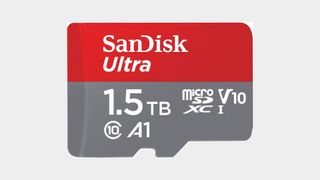
11. SanDisk Ultra 1.5TB
Specifications
Reasons to buy
Reasons to avoid
Picking up a SanDisk Ultra 1.5TB microSD card is going to give you heaps more storage without much effort. Just a year or two ago, seeing a tiny card with this sort of capacity at retailers would have sounded a few scam alarm bells, but we're now at a stage where SSD-sized options are becoming a norm.
✅You need an easy storage upgrade: This card will add more than the top Steam Deck can hold without having to open the handheld up.
✅You want a single card: Picking up the 1.5TB variant will save you swapping out several cards with your library spread across them.
❌ You need even more storage: If you want to reach that 2TB sweet spot, you'll have to use an SSD to upgrade the Deck's innards.
❌ You still have loads of storage: Those of you who haven't maxed out their Steam Deck storage yet probably don't have to buy this microSD card right away.
Design: On the face of things, this Sandisk Ultra microSD card looks like, well, a microSD card. You're effectively getting what'd be a capacity we'd expect from an SSD in something the size of your thumbnail, and the Steam Deck will happily make use of its space using its bottom card slot.
Features: Western Digital claims its Sandisk Ultra microSD cards are "fastest in the world," thanks to their 150MB/s capabilities. In practice, using one of these cards with the Steam Deck results in respectable load times that aren't that far off the handheld's own built-in storage. Your mileage could vary depending on the game, but the average user isn't going to notice a difference, all while holding potentially more than your specific model can.
Performance: During typical use, we didn't spot any shenanigans from Sandisk's Ultra microSD card. We've used a variety of capacities across a multitude of devices, and each variant always stands up as a reliable and fast method of storing games and apps. Some cards in our collection have been valiantly holding our libraries for a few years, and the 1.5TB version should serve as great Steam Deck storage for the long-haul.
Verdict: If you really can't stomach switching out the Deck's internal SSD, but need more than the 1TB included with the top Steam Deck OLED model, picking up the SanDisk Ultra 1.5TB is a no-brainer. Just keep in mind that you could potentially pick up several smaller cards for the price this one costs, and that's a valid option.
What Steam Deck add-ons should you buy first?

So, you've just picked up a shiny new Steam Deck, and Valve even threw in a case for good measure. At this stage, you might be wondering what accessories you should buy first, as it's sometimes hard to separate priority add-ons from nice to have extras. There are a few core pieces we'd suggest investing in first, as they'll both protect your gaming gadget and enhance your experience.
Screen protectors: They're far from the most exciting Steam Deck accessory out there, but using a screen protector from day one will ensure your handheld screen stays fresh. Even if you only use the portable PC at home, it's easier than you'd think to accidentally scratch the glass on Valve's device, which in turn could disrupt your gaming sessions and cramp its style.
Docking stations: Picking up a Steam Deck dock really enhances the handheld's versatility, providing it with similar functionality to hybrids like the Nintendo Switch. While the main reason to pick one up is easy video output via HDMI and extra ports for peripherals, docks also make for a nice place to rest your portable during charging.
MicroSD cards: Not everyone will run out of Steam Deck storage immediately, but picking up a microSD will save you from the horrors of storage woes. Even if you'd rather upgrade your handheld's internal SSD, having an external card handy will help you expand things even further, in turn enabling to to take more of your Steam backlog with you.
Power banks: Like it or not, handhelds simply aren't at the stage where they can run for more than a few hours. If you're planning on playing new releases, or even just want a journey's worth of play, you'll want to pick up a power bank. Not only will it keep your handheld charged when away from outlets, but options with more than 45W Power Delivery will also keep any connected add-ons powered too, including portable monitors.
FAQ
What accessories should I get for Steam Deck?
The best approach with picking up Steam Deck accessories is to start with the basics, like a screen protector and a case if you haven't got one already. Once your handheld is protected, you can start thinking about whether you'd benefit from a power bank for extra portable juice or a docking station that'll hook up to your TV or monitor.
What accessories come with the Steam Deck?
Valve's Steam Deck comes with a charger and carry cases included if you buy it new, which will save you from picking up third-party options. However, it's worth looking at additional add-ons and cases with more functionality, as there are alternatives out there that will hold more and offer more padding.
Is the Steam Deck fragile
No, the Steam Deck isn't fragile, but that doesn't mean it's immune to accidental damage. If you drop it from a height, there's always a risk that its screen will smash and internal components could pop out of place. Using a protective shell can offset some of this, but you'll still want to be careful to keep the handheld out of harm's way.
Looking for more handheld add-ons? Swing by the best Nintendo Switch accessories and best Switch cases for Ninty flavored options. Alternatively, take a peek at the best portable monitors for gaming if you need an on-the-go screen.
Sign up to the 12DOVE Newsletter
Weekly digests, tales from the communities you love, and more

I’ve been messing around with PCs, video game consoles, and tech since before I could speak. Don’t get me wrong, I kickstarted my relationship with technology by jamming a Hot Wheels double-decker bus into my parent’s VCR, but we all have to start somewhere. I even somehow managed to become a walking, talking buyer’s guide at my teenage supermarket job, which helped me accept my career fate. So, rather than try to realise my musician dreams, or see out my University degree, I started running my own retro pop culture site and writing about video games and tech for the likes of TechRadar, The Daily Star, and the BBC before eventually ending up with a job covering graphics card shenanigans at PCGamesN. Now, I’m your friendly neighbourhood Hardware Editor at GamesRadar, and it’s my job to make sure you can kick butt in all your favourite games using the best gaming hardware, whether you’re a sucker for handhelds like the Steam Deck and Nintendo Switch or a hardcore gaming PC enthusiast.
Most Popular





